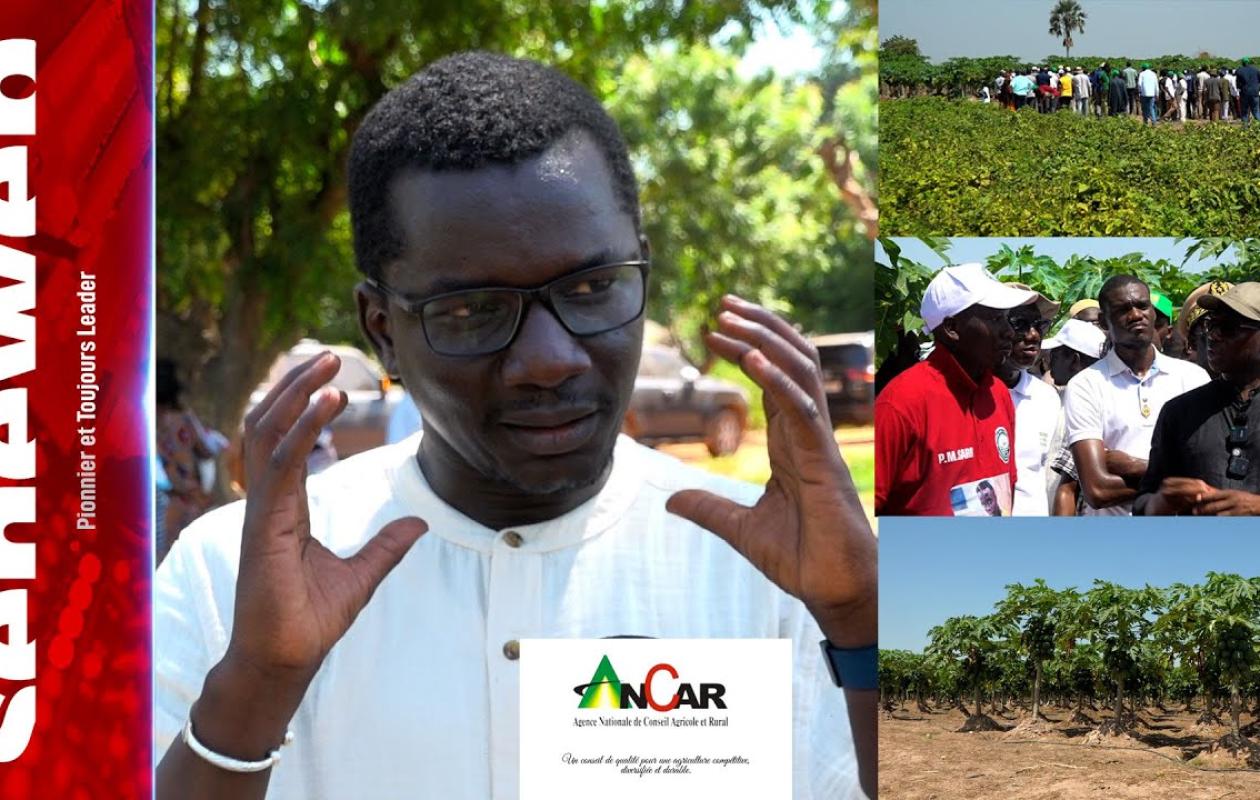
ANCAR : l’arme secrète du Sénégal pour réussir sa souveraineté alimentaire
Speaking to Seneweb, El Hadji Faye, Director General of the National Agency for Agricultural and Rural Advisory Services (ANCAR), shared the vision of this organization, which plays a central role in Senegal's agricultural policy. Behind his calm demeanor, one could discern the conviction of a man deeply involved in the field, who believes that agricultural success depends not only on inputs or machinery, but above all on human support and knowledge sharing.
ANCAR, attached to the Ministry of Agriculture, Livestock and Food Sovereignty, works to support producers with all aspects of agricultural production advice. Therefore, its mission goes beyond simple technical assistance. It is based on comprehensive support that integrates training, management, planning, and networking with other organizations.
According to El Hadji Faye, the state has put in place several mechanisms to support producers. Among them, "there is what we call support during the agricultural season, for example in the provision of inputs." He specifies: "These inputs include seeds, fertilizers, but there is also what we call advisory services."
An initiative that goes far beyond the fields
The director general emphasizes the need for ongoing technical support: “Agriculture is a constantly evolving activity. Our producers possess knowledge that must be respected, because it is inherited from tradition, but it also needs to be adapted to external factors, such as climate change.” ANCAR supports farmers “in all aspects of capacity building, training, information, and awareness-raising, for example, regarding the climate situation.” The goal is to enable producers to plan, choose appropriate seeds, and improve their yields.
But agricultural advisory services don't stop at the field. The agency also promotes a culture of management and organization: "Today, agriculture is a profession, and a family farm is a business." Following this logic, ANCAR encourages producers to keep operating accounts and develop business plans. "Management consulting will allow organizations to have business plans and adapt to the current situation," he says.
Proximity is one of the agency's main characteristics. Present at the municipal level, it acts as an intermediary between producers and support structures. "The producer who is in his field doesn't always have the time to visit each structure. It is the ANCAR agent who is responsible for making this connection," he explains.
A methodology adapted to the rural world
“The state cannot support producers individually. They must be brought together,” El Hadji Faye points out, before adding: “This grouping raises many issues and challenges, so this dynamic must be supported through information, awareness-raising, and formalization.” The agency does not limit its work to agriculture. It also intervenes in livestock farming, fishing, forestry, and activities related to gathering. This integrated approach to rural development allows for income diversification and ensures greater sustainability for farms.
When asked about the challenges of training in rural areas, often characterized by low literacy rates, the director general described a specific approach. “We work with research institutions, particularly ISRA, for technology transfer. We adapt tools and translate concepts into local languages, using language understandable to producers,” he explained. This methodology, described as “made in ANCAR,” is based on “training tailored to the realities and specific topics of the work.”
ANCAR relies on a network of farmer liaisons to disseminate messages on the ground. “Every time an agent transmits information, they also share it with farmer liaisons who remain in the villages. It’s a whole complementary chain with a diverse range of actors.” According to El Hadji Faye, “The state can’t give a tractor to every producer. They need to be grouped together.” This method already gives them “an advantage, because they can work directly with partners in terms of access to financing.”
The training aims to increase yields without indefinitely expanding cultivated areas. "We need intensification within small plots to achieve record yields," he explains. The farmer field school project, developed with the FAO, aligns perfectly with this ambition: "It's an interesting tool where farmers learn at the school, but at the field level."
November 11-13: Dakar, capital of agricultural advice
Money is the lifeblood of any operation. A saying that resonates particularly in rural agriculture. Here again, the organization assists its partners in their efforts to obtain financing: "The ANCAR agent, present in the field, helps producers formulate projects to access funding." Among the programs mentioned is the Food System Resilience Program in Senegal (FSRP), which directly supports farmers.
Senegal is preparing to host a global event in the agricultural advisory sector. The director general reflects on its importance: "Agricultural advisory services have become a major issue. You can provide a thousand tractors, but if there's no advice behind them, after a year you come back and see that the farmers don't know how to use them."
From November 11 to 13, the country will host the World Forum on Agricultural Advisory Services at the CICAD, organized under the auspices of the Ministry of Agriculture. "This is a recognition for Senegal," affirms El Hadji Faye. The event will bring together "250 participants from all over the world" around one objective: "to see how we can innovate advisory services and further empower farmers."
Commentaires (0)
Participer à la Discussion
Règles de la communauté :
💡 Astuce : Utilisez des emojis depuis votre téléphone ou le module emoji ci-dessous. Cliquez sur GIF pour ajouter un GIF animé. Collez un lien X/Twitter ou TikTok pour l'afficher automatiquement.